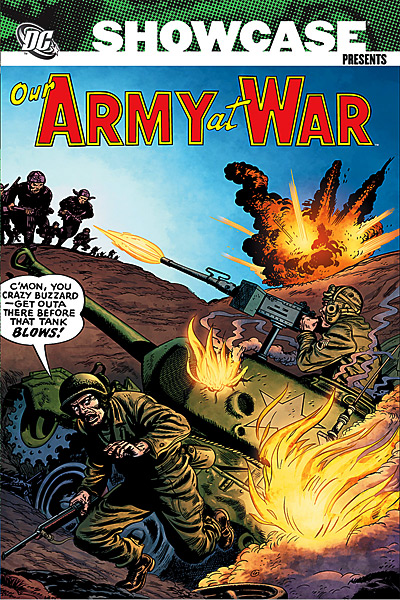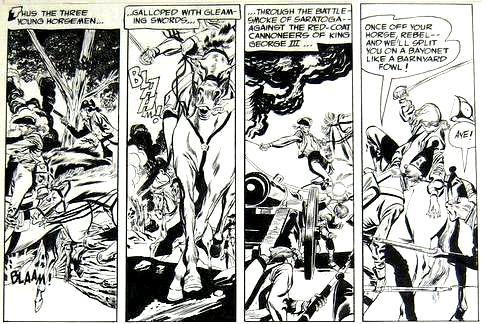Showcase Presents Our Army At War 1
Reviewed by Martin Skidmore 21-Dec-10
I think this is the earliest material DC have reprinted in a Showcase volume – it starts in 1952. I guess this is partly because that’s where the series started, but the fact that it doesn’t look Golden Age must have helped the decision – the standard style for war comics doesn’t seem to have changed so much, and bar the odd racist exaggeration of the Japanese enemies, a lot of this would hardly look out of place today.
 collects Our Army At War 1-20.
collects Our Army At War 1-20.
I think this is the earliest material DC have reprinted in a Showcase volume – it starts in 1952. I guess this is partly because that’s where the series started, but the fact that it doesn’t look Golden Age must have helped the decision – the standard style for war comics doesn’t seem to have changed so much, and bar the odd racist exaggeration of the Japanese enemies, a lot of this would hardly look out of place today. There’s also surely a clue in the fact that the last but one Showcase volume was Sgt Rock volume 3: I assume that the war collections are doing good business.
The other reason for reaching back this far is surely the quality of the early material here: the first five issues include Carmine Infantino, Gil Kane, Jerry Grandenetti, Gene Colan, Mort Drucker and one of the greatest American comic artists ever, Bernie Krigstein, plus solid lesser talents like Irv Novick, Frank Giacoia and Bob Oksner, with little of really inferior quality: this isn’t terribly far behind EC’s much more celebrated war comics of the same period.
EC was clearly a big inspiration here: you can see it in the four stories per issue, the two-thirds splashes, the wordy prequel to each title, even the lettering of some story titles; and more importantly, in the writing style. EC’s Harvey Kurtzmann is one of the greatest talents comics have ever had, genuinely brilliant whether being serious or funny, realistic or cartoony; DC’s war editor Robert Kanigher was never in that league, but few people have executed this genre better, and few writers have proven better craftsman of the short story. I love Sgt Rock more thanks to the lengthy run by the great Joe Kubert (who I like better than any of EC’s regular war artists), but in all honesty, freed from the limitations of the same set of characters every time and having to keep the almost superheroic leads alive, these strike me as generally better stories – and also I think he settled into a rhythm and a formula on later work, which I guess the roster of writers here also helps avoid, though I suspect one or two may be Kanigher pseudonyms. (And to be honest, the keenness to explore every military role not usually considered heroic, and give the engineer, cook, MP and so on something medal-worthy to do does get a bit tedious by the end – though this is by no means all Kanigher.)
Not that any of the other writers are as good as Kanigher, but most are at least okay, and I am impressed with the inventiveness and solidity of Dave Wood’s work. Kanigher is often at his best here, sometimes in ways that don’t seem like the Kanigher style – yes, one or two hammer their point or metaphor home unrelentingly and even wearingly, but the second story in this collection has little dialogue, and is brilliant, one of his best ever. It also makes me think I may have been unfair to Novick above – I’ve never been a fan, but his job on this, which is largely dialogue free, is really superb, atmospheric, tense and with magnificent control of timing and implication – a few key moments are not shown and must be inferred. This honestly ranks with anyone short of Krigstein in this book (except maybe one lovely story inked as well as pencilled by Colan), and I didn’t expect to be thinking that. I’m normally even less keen on Ross Andru & Mike Esposito, but actually their work back here was really lovely – ‘Battle of the Bugles’ in #16 is a beautiful job, for instance, reminiscent of Wally Wood.
 But if you aren’t a war comics fan and don’t love Kanigher, the reason why this could be of interest to any comic fan is Bernie Krigstein. There are seven stories plus a cover here, and they justify the price on their own. Comics have had few draftsmen to match Krigstein, and maybe none who have applied his sharpness of intelligence to laying out comics. His most daring work in that line comes a little after these, and there are none of the storytelling devices that astonished on EC’s suspense comics, but the drawing is breathtaking, and the compositions marvellous. You could search for a long time, at least if you keep this side of Alex Toth, without finding anyone where each panel is so worth a close look, where each moment contributes to the narrative and its effect so tellingly. These are glorious stories, and it’s worth having this collection just for these.
But if you aren’t a war comics fan and don’t love Kanigher, the reason why this could be of interest to any comic fan is Bernie Krigstein. There are seven stories plus a cover here, and they justify the price on their own. Comics have had few draftsmen to match Krigstein, and maybe none who have applied his sharpness of intelligence to laying out comics. His most daring work in that line comes a little after these, and there are none of the storytelling devices that astonished on EC’s suspense comics, but the drawing is breathtaking, and the compositions marvellous. You could search for a long time, at least if you keep this side of Alex Toth, without finding anyone where each panel is so worth a close look, where each moment contributes to the narrative and its effect so tellingly. These are glorious stories, and it’s worth having this collection just for these.
On the other hand, having said all these enthusiastic things, a note of caution: these are war stories, and if the comic’s title doesn’t clue you in that they tend very firmly towards the jingoistic, you’ll surely know that in the early ’50s there was no other option. There is nothing remotely like Kanigher’s later Enemy Ace, no hint of seeing the other side, just ‘our’ (well, I’m English) brave boys. Reading 500 pages of this in a couple of days does make you wonder why the war wasn’t over within weeks, given the astounding heroism and effectiveness of every American soldier, any one of whom rises to any occasion and kills a whole bunch of enemies. Yes, I know: I am being disingenuous here. Of course these stories are like this, but they are a bit much en masse, even with the undoubted strong qualities.
Ultimately, I think most of that strength boils down to craft. Krigstein’s brilliance is beyond that, but that’s less than a tenth of the book, and Infantino, Kane and Colan (bar the one story mentioned above) are not at their best. What we do get in the stories and art is solid craftsmanship: writing with a point and purpose and shape, and generally with an idea or two; art that tells the story, where you always know what is happening and can read the expression in bodies and faces, and that carries drama and force. This may not sound like much, but since starting this site I’ve read a lot of comics from the Big Two that fail on many or even almost all of these, so it shouldn’t be neglected.
Tags: Bernie Krigstein, DC, Irv Novick, Our Army At War, Robert Kanigher, War
A great review Martin, I might be more inclined to buy this book than I was before I read your review. Jury’s still hovering at the moment.
However the statement in your last two sentences is all too true.